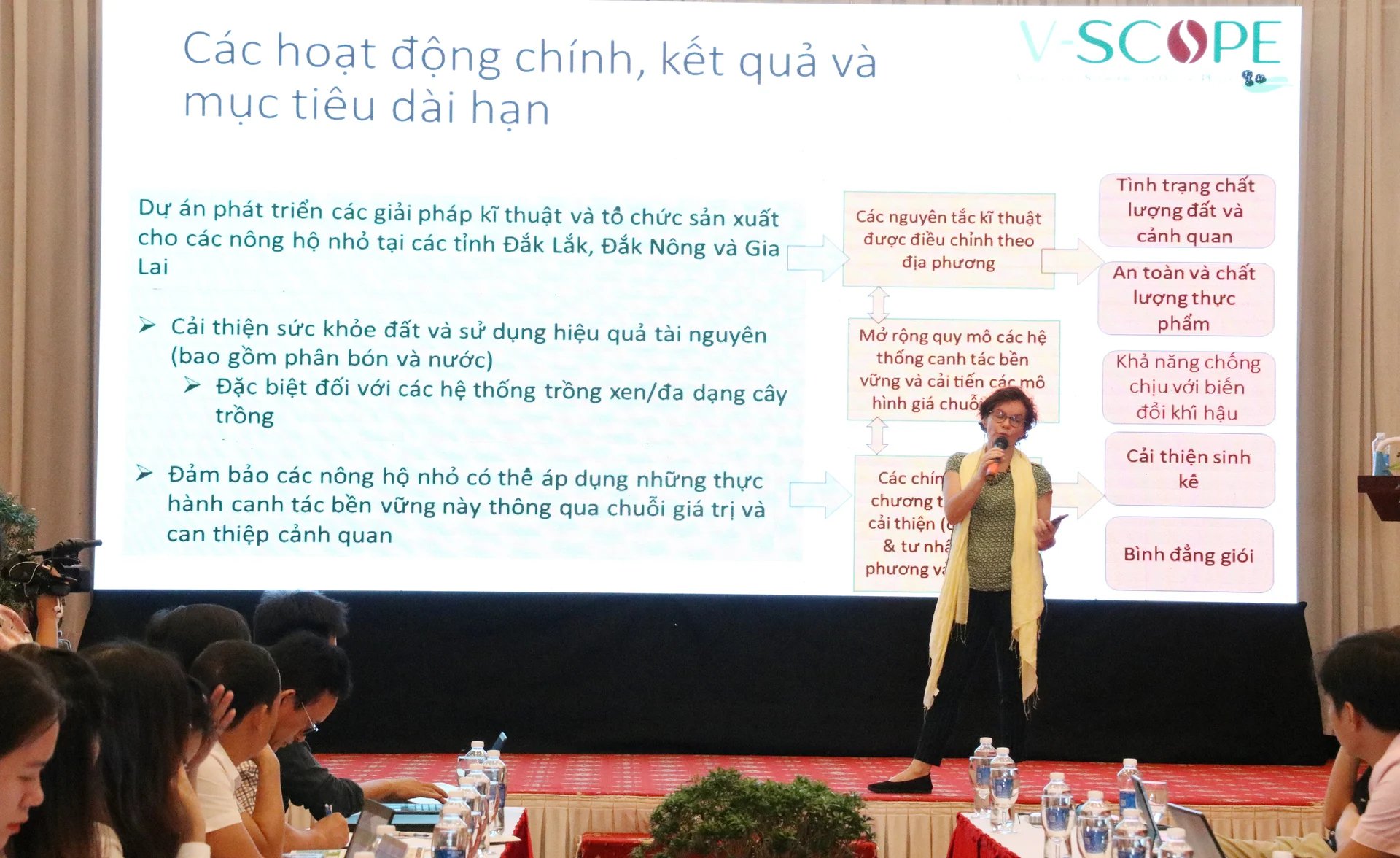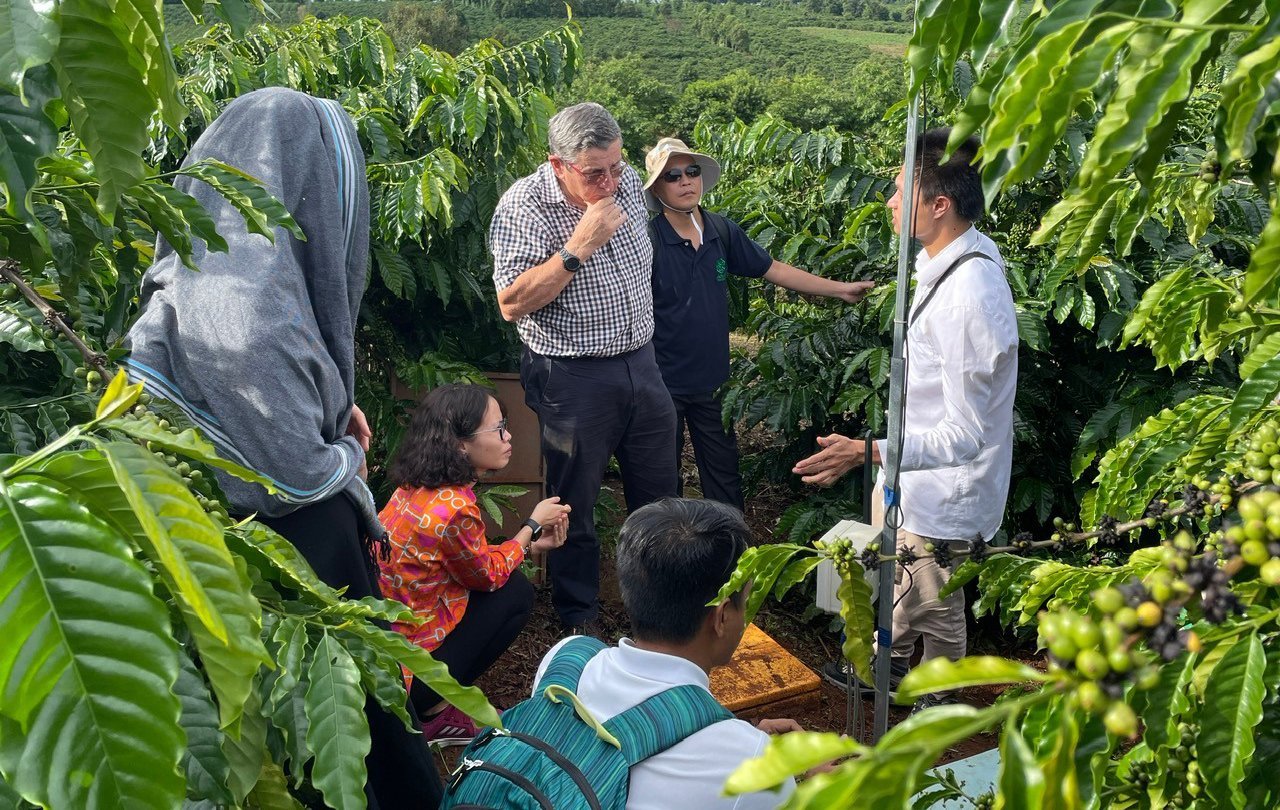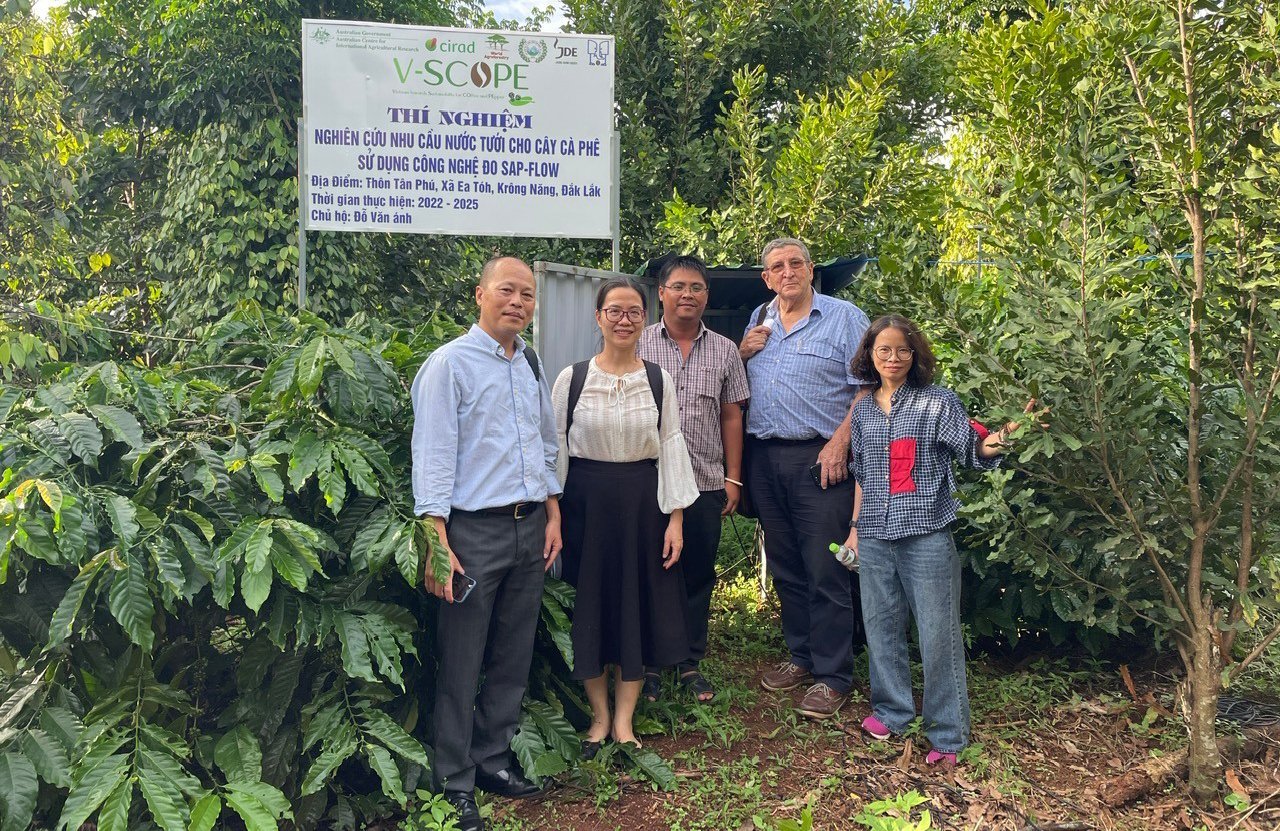May 26, 2025 | 03:24 GMT +7
May 26, 2025 | 03:24 GMT +7
Hotline: 0913.378.918
May 26, 2025 | 03:24 GMT +7
Hotline: 0913.378.918
On October 12, the V-SCOPE Project holds a meeting to summarize activities in 2023 for the project “Increasing the sustainability, productivity and economic value of coffee and black pepper farming systems and value chains in the Central Highlands region of Vietnam” in Dak Lak province.
The project is funded by the Australian Center for International Agricultural Research (ACIAR) and implemented by the International Center for Agroforestry Research (ICRAF - also known as World Agroforestry), in collaboration with the Center for Agricultural Research. The French International Development Corporation (CIRAD) is the human resources provider for the project.
Attending were representatives of the project’s partners from MARD’s departments, agencies and branches from the provinces where the project is implemented, including Dak Lak, Dak Nong and Gia Lai; the Vietnam Academy of Agricultural Sciences, and relevant institutes, schools, research centers; as well as representatives from businesses and domestic partners.
At the meeting, Dr. Estelle Biénabe, Head of the V-SCOPE Project, states that the research project aims to improve productivity, sustainability and economic value of the farming system and value chain of coffee and pepper.
According to Dr. Estelle Biénabe, the project was initiated to address soil degradation, chemical and water abuse; poor management of intercropping and farm diversification; poor Robusta coffee quality; food safety issues; low-value products that are easily affected by international prices; and vulnerability to climate change nowadays.

Dr. Estelle Biénabe, V-SCOPE Project Leader, introduces the project and the goals achieved. Photo: Quang Yen.
The project has four main components: Improving soil health and controlling soil-borne pests on coffee and pepper farms as well as in nurseries; Sustainable farming methods and cropping systems to bring economic efficiency, suitable for various contexts; Improving local value chains to enhance national public-private dialogue; Improving multi-stakeholder landscape initiatives and scaling strategies to enhance local public-private dialogue.
“After implementation, the project has achieved many positive results. Notably, research in three dry seasons shows that coffee trees grown under the shade of fruit trees have 20 - 30% lower water consumption compared to monoculture conditions.
Besides, the project has many interesting outcomes, including identifying the cause of the disease in pepper roots. The test plots also pointed out the low efficiency of using NPK.
In addition, the project also classifies five areas affected by climate change corresponding to different adaptation strategies. Meanwhile, the assessment results on labor and economic efficiency of coffee and pepper-based farming systems in Vietnam show a significant difference in total labor demand,” Dr. Estelle Bienabe shares.
Mr. Nguyen Van Long, a member of the coffee and pepper soil health research team, says that the research team has achieved specific results in testing some types of biological products on the market that have the ability to prevent nematodes on coffee plants in greenhouses.

Dr. Howard Hall, Special Advisor on Commercial Engagement and Adoption of ACIAR, visits the project in Dak Lak. Photo: V-SCOPE project.
While collecting 15 biological products on robusta coffee plants in the Central Highlands, the research team selected five potential products for reducing nematodes in soil. Based on these results, the research team will continue to analyze the ingredients and quality of the preparations.
When the research results are available if the ingredients and quality are guaranteed, the team will test on coffee and pepper gardens to evaluate the ability to react in the field. The team also completed research on soil health-related properties and discovered that soil pH was slightly higher with lime than with biochar. At the same time, potassium oxide (K2O) increased significantly when applying biochar. Results on soil fungus and nematode densities showed that liming alone was insufficient to impact soil-borne pest and disease reduction significantly.
Based on these two research results, the group will implement it to help sustainable coffee and pepper cultivation, thereby minimizing the source of chemical fertilizers in the soil,” Mr. Long informs.
As one of the localities chosen by the project to carry out research, Mr. Le Ky Su, Head of the Department of Agriculture and Rural Development of Krong Nang district (Dak Lak) says, the locality will benefit significantly from the project.
According to Mr. Su, the project analyzes soil health to recommend farmers on how to balance the nutrients that the soil is lacking. Excess nutrients need to be limited to avoid waste.
“In addition, the project also recommends that people irrigate to save water, ensure environmental protection for coffee and pepper growing areas in the garden, and avoid waste. The district regularly coordinates and supports project experts to deploy local content, striving for research results as quickly as possible to transfer to farmers,” Mr. Su adds.

Delegates visit an experimental model to study water needs for coffee plants using SAP-FLOW measurement technology. Photo: V-SCOPE project.
During the closing session, V-SCOPE also strengthens public-private partnership by launching a project under the Commercial Engagement Fund (CEF), funded by ACIAR. There are currently 7 Vietnamese companies participating and collaborating in this project.
By establishing a network, V-SCOPE is making a good case study of how companies can work together without feeling like competitors.
According to Dr. Howard Hall, Special Advisor on Commercial Engagement and Adoption of ACIAR, “this project is truly a great example of how to engage and bring competing companies together.”
He elaborates that in implementing the ACIAR project, a valuable lesson is that if you want to engage private companies in the project successfully, you must engage them from the proposal writing stage. When you make competing companies feel included in the project, they will automatically bond with each other.
The project “Increasing the sustainability, productivity and economic value of coffee and black pepper farming systems and value chains in the Central Highlands region of Vietnam” (V-SCOPE) aims to improve livelihoods for smallholder farmers and rural communities. In addition, the project supports natural resource management. It makes production more sustainable, as well as promoting a more inclusive agri-food market chain through partnerships with the private sector and farmers.
Translated by Quynh Chi
/2025/05/25/4127-3-073637_820.jpg)
(VAN) Thanks to the promotion from an FAO-implemented project, vegetable production in greenhouses in Moc Chau has seen strong development, from 1.5 hectares in 2021 to nearly 50 hectares in 2024.

(VAN) FAO has recently supported USD 140,000 to implement the project 'Risk mitigation human-animal interface risks through disease control initiatives in pig farming.'

(VAN) The People's Committee of Tra Vinh province has approved an adjustment to the investment policy for the Green Hydrogen Plant project, increasing its area to approximately 52.76 hectares.
![Reducing emissions from rice fields: [2] Farmers’ commitment to the soil](https://t.ex-cdn.com/nongnghiepmoitruong.vn/608w/files/news/2025/05/05/dsc08881jpg-nongnghiep-140632.jpg)
(VAN) Clean rice cultivation model in Thuong Tan commune, Bac Tan Uyen district, is assisting local residents in achieving sustainable agriculture by substantially reducing costs, increasing productivity, and protecting the environment.

(VAN) At the conference to disseminate Resolution No. 68, AgriS introduced its digital agricultural ecosystem and reaffirmed its commitment to accompanying the Government in promoting private sector development and sustainable agriculture.

(VAN) 'Blue Ocean - Blue Foods' initiative is designed to restore marine ecosystems and establish sustainable livelihoods for local communities by cultivating a minimum of 1,000 hectares of cottonii seaweed in the first three years.
/2025/05/21/4642-3-112707_603.jpg)
(VAN) The V-SCOPE project has made direct contributions to three out of six pillars of the Comprehensive Strategic Partnership between Vietnam and Australia.